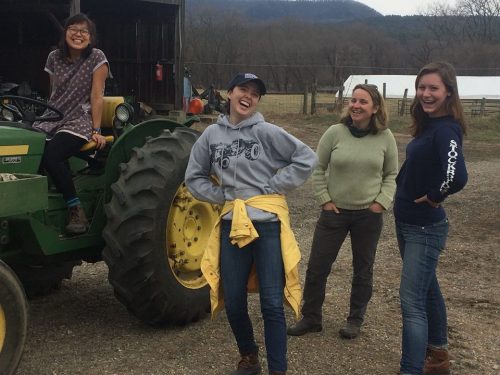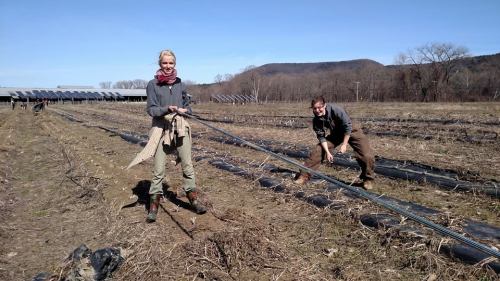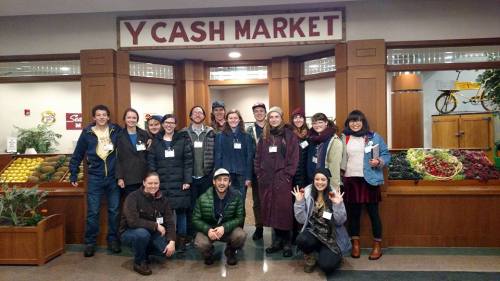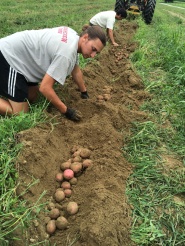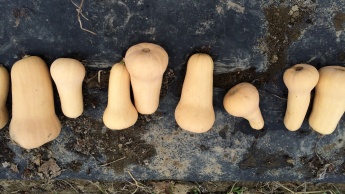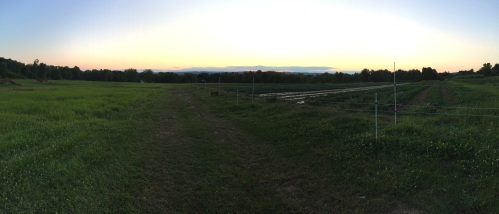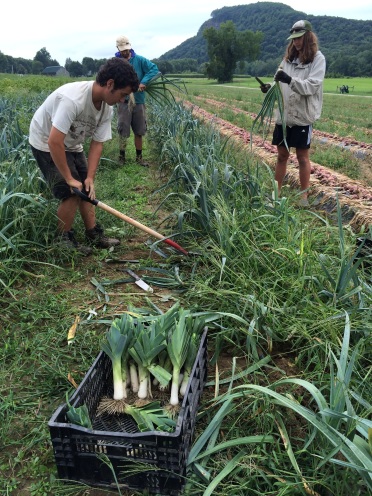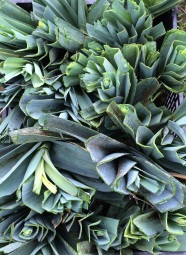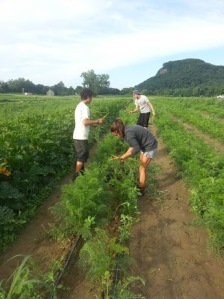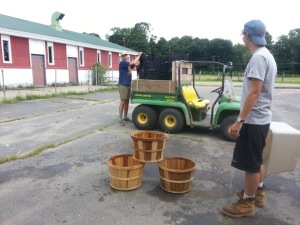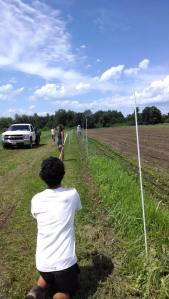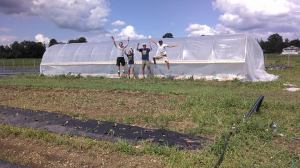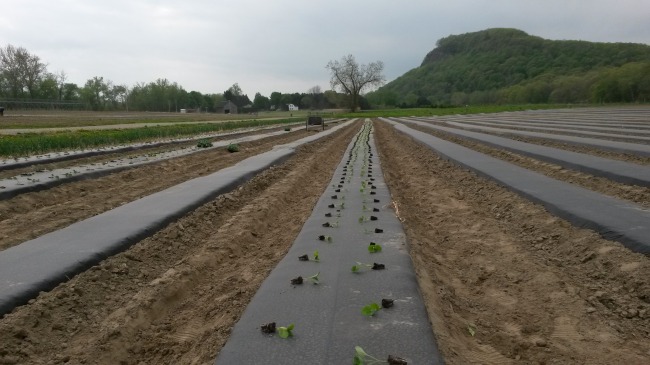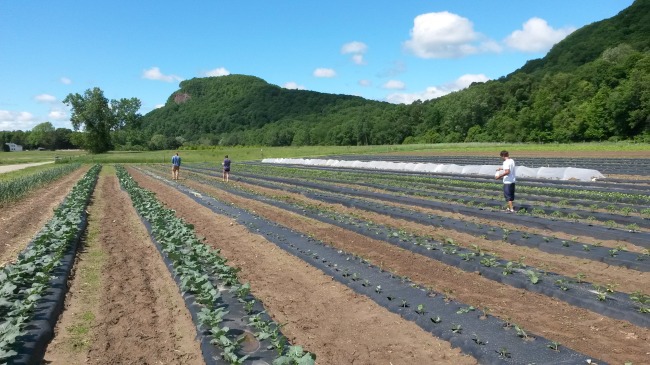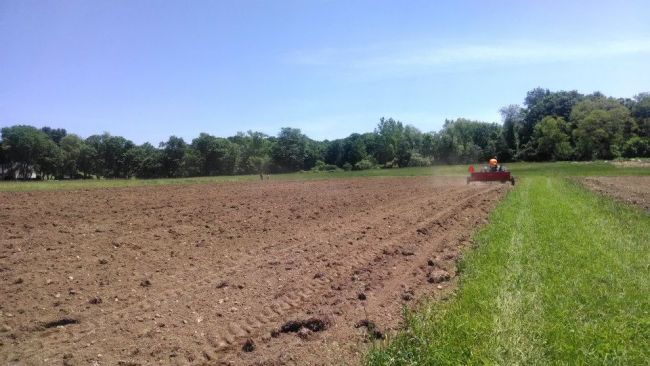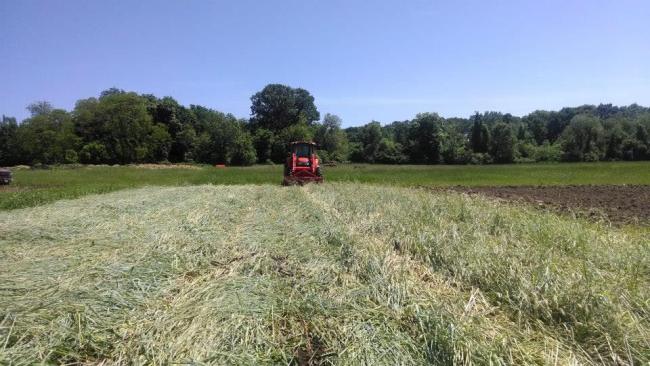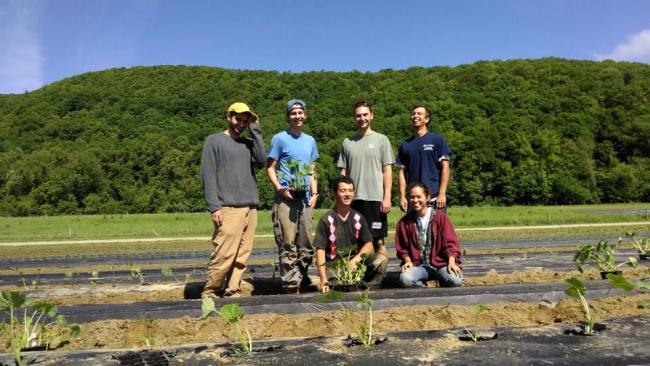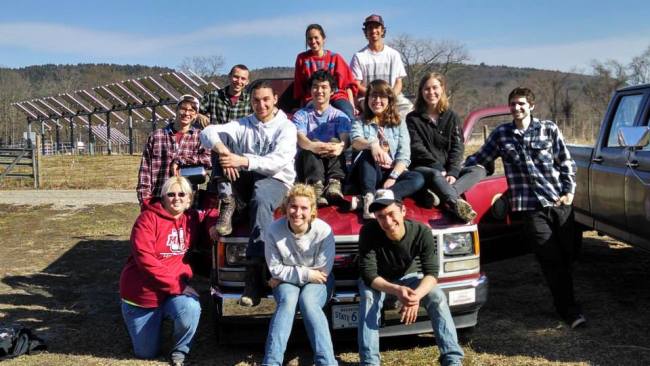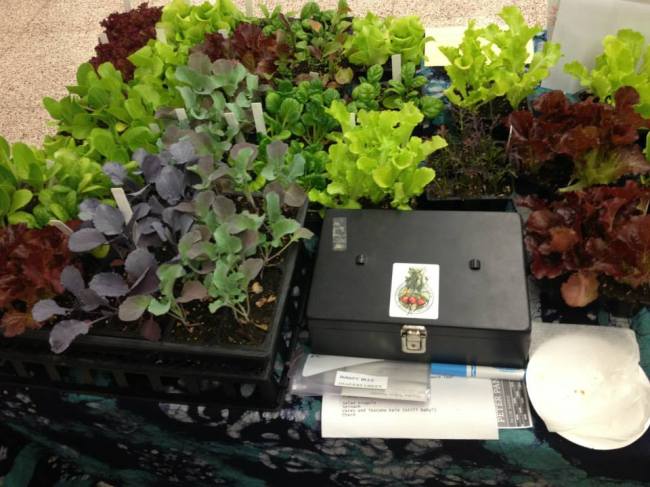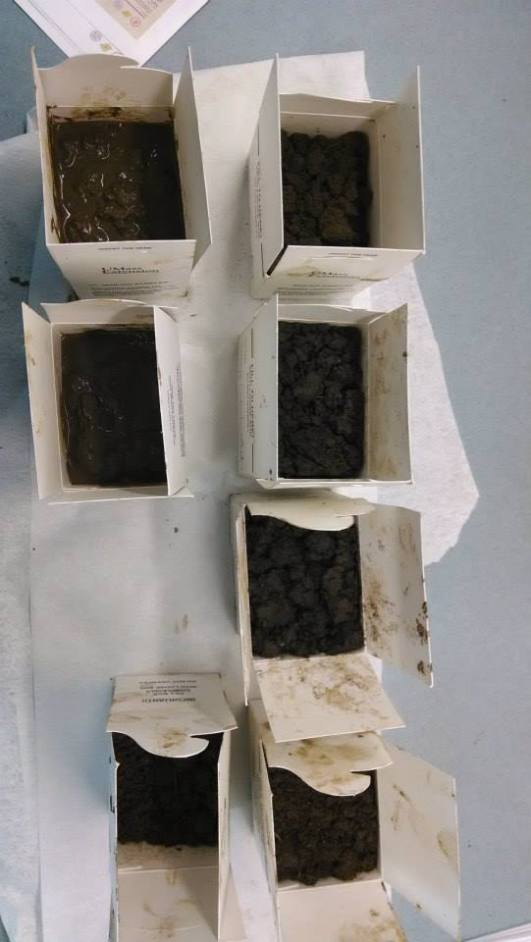Greetings from the Student Farm once again, and happy May! We have had a busy few weeks. Highlights include plowing, cutting potatoes for planting, planting potatoes, transplanting onions, getting soaked in the rain and wrapping up the semester with an awesome potluck to celebrate our work. We also had our last spring market on April 25th, and that was great-we sold pea shoots, t-shirts and more transplants! The other big news is that we are up to 29 CSA members, the highest we’ve ever had for this time of year!
On Wednesday, April 23rd, we all got a chance to drive our older tractor, the Massey Ferguson 175, to plow our middle field at South Deerfield. It was a little nerve-wracking, as the tractor is big itself, and then you have a heavy plow attached to it. The tractor was also at an angle, lower on the right side to keep the right two wheels aligned in the dead furrow, which is basically a strip that will always exist where the tractor wheels have been because the plow cannot reach it. We had to learn how to raise and lower the plow piece and how to switch between the two speeds high and low and change gear. Luckily, we had Jason walking alongside us the entire time, and we were grateful for his help and pointers. The first few times watching the plow was amazing-suddenly the field went from leftover green cover crop to rich brown soil ready for planting. The plow essentially flips the soil over in this really cool rotating motion, flipping it to the right for now. Next year, we’ll flip it to the left to help reduce the damage of plowing on the soil and avoid extreme compaction. The tractor had to be driven really straight and fairly slow too, which isn’t easy. At the end of the field, we had to raise the plow piece and drive around the field in a half circle to get back to where we started and make a really wide turn to align it for the next row. Plowing can only be done in one direction, otherwise the dead furrow ends up in the middle of the field and that’s not healthy, and makes it harder to plant. Despite all of the challenges, plowing was one of the biggest highlights this semester!
On Monday April 28th, we spent the morning in the barn in our indoor space, cutting seed potatoes. There were sacks upon sacks to go through. What is a seed potato, you ask? Well, it is a potato that has sprouts already emerging from its eyes, and it has been specifically produced for growing, with disease tests run on it to make sure it is the highest quality possible. The potatoes you find in grocery stores have often been pre-treated to make sure the eyes don’t grow, as they are poisonous to us. But don’t you worry-I assure you our potatoes are 100% safe to eat. If you see an eye, just cut it off carefully, there’s no need to get rid of the entire potato. Or you could try and grow a potato plant from it (that is if you’re feeling ambitious.) We set up tables and cutting boards, and got to work, taking handfuls of potatoes from the bags and cutting them into smaller pieces, each with an eye on the section. The gross ones were composted. By the end of class, we had filled every available flat surface with cut potatoes-it was quite the sight! Some of them even had to be migrated into the room next door to accommodate the insane numbers! We left them there to dry out a bit and become fully ready for planting.
On Wednesday April 30th, our last official day of class, we headed out to the farm with the onion transplants from our greenhouses and spent the afternoon planting onions and potatoes in the pouring rain. We had a potluck beforehand, so that raised the spirits and got everyone ready to face the nasty weather. After all, farming must go on, rain or shine. There was no possibility of waiting. People brought lots of yummy food that they had made, and we filled out final evaluations and chatted about tractors, summer plans, and how much we were all going to miss each other and how happy we were about out awesome semester. It was another big highlight of the semester. Then, we headed out into the rain, and boy, did we get drenched. Most of us were soaked from head to toe; some of us had forgotten rain gear (oops)! The fields turned to mud, but we pushed on and so did our equipment.
We popped the onions out of their spots in the flats that we had originally planted them in and laid them out on empty flats so that those planting could have easier access to them. Amanda and Jason had already laid the black plastic that we use to keep the bed shape, reduce weeds, and pests for the onions. The transplanter was started and in position, ready to go. With Amanda driving, two people rode on the back, each with flats of onions on two slanted trays above us. As the transplanter moved, triangular spokes poked holes in the plastic and each person dropped three onion transplants into the hole. Others followed, tucking in the onion plants and making sure they had adequate space. Despite how slowly we were moving, it was hard to keep up, and the rain made everything worse. Yet, we managed to get an entire row planted. The beds are long; in the rain they can seem endless. It felt good to accomplish something though, and we trudged on.
Planting potatoes was much simpler, and another highlight. The cut potatoes were put into the potato planter, attached to the tractor that Jason was driving. They go into a hopper that feeds down into a tray, from which whoever is riding on the planter must grab the potato places and drop them into each slot on the spinning circular disk just below as it spins. It’s important to keep up and try not to drop potato pieces off the side. The spinning disk controls where they fall into the soil, and it is adjusted to the right depth and spacing. Most of the time, the planter succeeds in burying the potatoes as it goes, but we had someone follow behind just to make sure every potato piece was getting covered. We got a lot accomplished, four rows, if I’m correct, because the potato planter moved faster than the transplanter. It was easily the most fun task of all, and wasn’t too bad in the rain.
Yesterday, for our “final exam,” all of us came to the farm at some point in the day and worked for three hours to finish everything we had started on Wednesday. It went a lot quicker, partly because we had spread the work out all day and partly because it was drier and no longer raining, a big relief for everyone. It was really satisfying to continue the work, and we accomplished everything we had set out to do by the end of the day. It was a great way to end the semester, but bittersweet at the same time, as not all of us are able to work for the farm over the summer for various reasons. The team has grown really close this semester, and that’s one of the most beautiful things about this program. 14 complete strangers turned close friends and a tight-knit team in just 16 weeks. It will be hard to have the summer separation, but the farm will be in good hands with the summer crew and everyone will be back together this fall. So, to close out, thank you all for all the support that you have given us, we couldn’t have done it without your help. Stay tuned for more updates this summer, and this fall, and we can’t wait to show off our beautiful vegetables to all of campus this fall!
-The Student Farming Enterprise Team 2014
Read Full Post »
